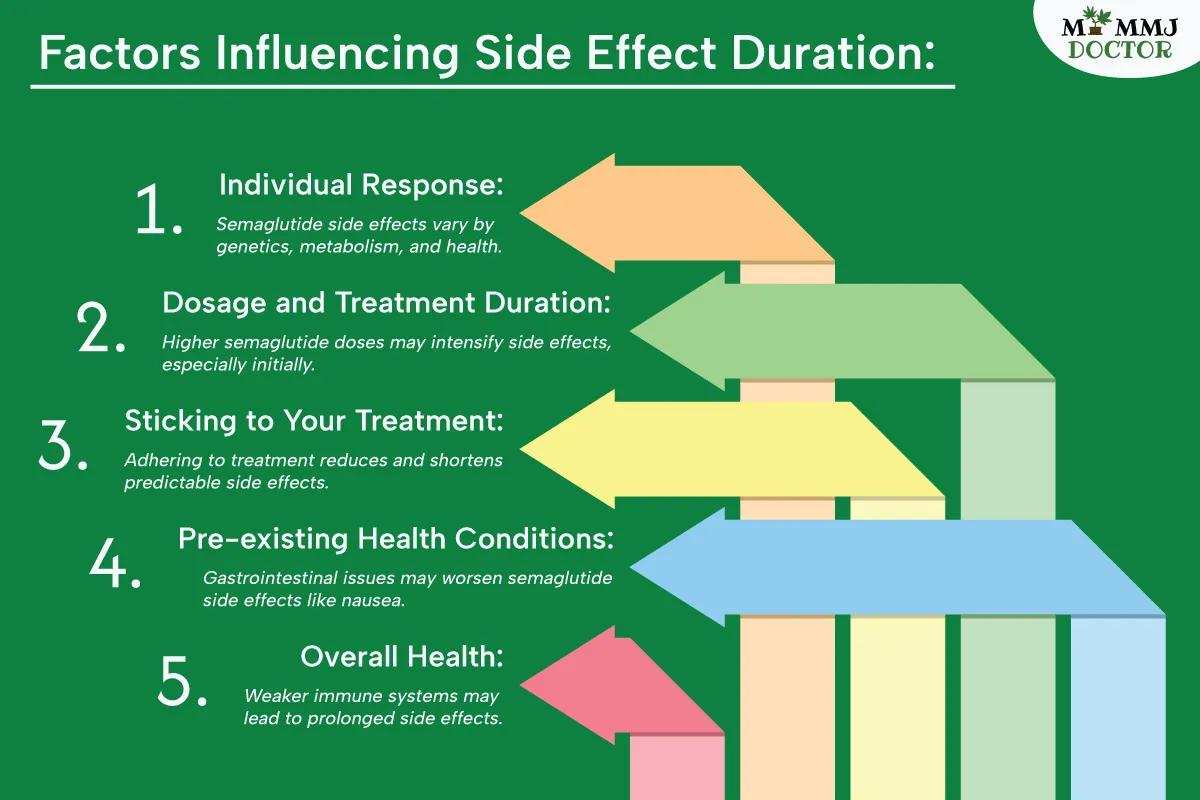How Long Do Semaglutide Side Effects Last? Everything You Need to Know

Taking semaglutide for weight loss is a significant step toward your health goals. Understanding how fast you might see weight loss results can help you stay motivated and informed about potential side effects. This guide will cover the common side effects, how long they typically last, and tips for managing them. Whether you’re just beginning your journey or already using semaglutide, understanding what to expect can help you stay confident and committed to your treatment.
What Exactly Is Semaglutide?
Common Side Effects of Semaglutide:
- Nausea and Vomiting:
These symptoms are expected during the first few weeks of treatment as your body adjusts to the medication. They generally improve within a few weeks to months. - Diarrhea:
Diarrhea often begins early in treatment but usually improves over time. Some people may experience occasional episodes throughout their treatment. Staying hydrated and adjusting your diet with gentle foods can help manage this symptom. - Headache:
Mild to moderate headaches may occur but often lessen as your body acclimates to semaglutide. - Abdominal Pain:
Discomfort or cramping in the abdomen is another common side effect, especially early on. While this usually improves, some people may experience it intermittently throughout their treatment. It’s essential to distinguish between this and other potential abdominal issues.
These side effects can be uncomfortable but are generally temporary and manageable.

Managing Common Side Effects:
- Nausea and Vomiting: Taking semaglutide with food or adjusting the timing of your dose can help reduce these symptoms. Anti-nausea medications may also be helpful for more severe cases.
- Diarrhea: Staying hydrated and eating bland, gentle foods can help manage diarrhea. If needed, over-the-counter medications may be recommended.
- Headache: Pain relievers like acetaminophen or ibuprofen can ease headaches. Staying hydrated and practicing relaxation techniques can also be beneficial.
- Abdominal Pain: Applying heat to the abdomen or taking over-the-counter pain relievers can alleviate discomfort. Avoiding trigger foods and following a balanced diet may also provide relief.
Short-Term vs. Long-Term Side Effects of Semaglutide
| Short-Term Side Effects | Long-Term Side Effects | |
|---|---|---|
| Onset | These begin soon after treatment, usually within the first few weeks. | These may appear later or continue beyond the initial phase of treatment. |
| Duration | They typically improve within a few weeks to months as your body adapts. | Long-term side effects can persist throughout treatment or emerge after extended use. |
| Management | Adjusting medication timing, staying hydrated, changing diet, and using over-the-counter meds can help. Starting with a lower dose might also be beneficial. | Regular monitoring and possible changes to treatment may be required. In some cases, alternative medications or extra care might be necessary. |

Factors Affecting the Duration of Side Effects
- Individual Response: The duration and severity of side effects can vary significantly from person to person. Genetics, metabolism, and overall health can influence how someone reacts to semaglutide. Some individuals experience only mild side effects, while others may have more intense or prolonged symptoms.
- Dosage and Treatment Duration: Higher doses of semaglutide can increase the likelihood and severity of side effects, particularly early in the treatment. While these often improve as the body adjusts, they may persist if the treatment continues for an extended period.
- Adherence to Treatment: Sticking to the prescribed treatment plan generally results in more predictable side effects that resolve on time. However, missing doses or not following the guidelines can prolong side effects or make them more severe.
- Pre-existing Health Conditions: Individuals with existing gastrointestinal issues may be more prone to side effects like nausea, vomiting, and diarrhea. Those with metabolic or pancreatic disorders might also have different reactions to semaglutide.
- Overall Health: Patients with weakened immune systems or chronic illnesses might experience longer-lasting side effects due to lower physical resilience. In contrast, healthier individuals may experience fewer issues during treatment.

Tips to Avoid and Manage Semaglutide Side Effects
- Adjusting Dosage:
Healthcare providers may change the semaglutide dose, gradually increasing it to help your body adapt. If side effects persist, lowering the dose or stopping the medication might be necessary. - Timing the Dose:
Taking semaglutide with meals or at bedtime can reduce stomach-related side effects. Your healthcare provider can recommend the best timing based on your daily routine. - Dietary and Lifestyle Changes:
Incorporating lifestyle changes to complement semaglutide treatment can significantly enhance its effectiveness, leading to optimal weight loss results. Focus on smaller, more frequent meals and avoid spicy, greasy, or acidic foods to help manage any side effects. Adding more fiber to your diet and drinking plenty of water will support digestive health. At the same time, daily workouts will boost your overall results. By pairing semaglutide with these lifestyle changes, you can achieve better and more sustainable weight loss. - Exercise Routine:
Regular exercise can improve digestion and reduce bloating or discomfort. A balanced routine with aerobic, strength, and flexibility exercises can enhance overall well-being. - Managing Symptoms:
Over-the-counter medications can help manage side effects. Doctor-prescribed antiemetics can help relieve nausea, while pain relief medications may help with headaches and abdominal pain. Always consult your healthcare provider before starting new medications. - Monitoring and Communication:
Keep your healthcare provider informed of new or worsening symptoms. They can offer advice and support to manage side effects and ensure your treatment is safe and effective.
Conclusion
Understanding the side effects of semaglutide and how long they may last is critical to making your treatment as smooth as possible. With the right approach and support, these side effects can often be managed effectively, allowing you to focus on achieving your weight loss goals. Always communicate with your healthcare provider if you have any concerns; they can offer personalized advice to help you stay on track.
FAQs
- How long do the side effects last? Most side effects diminish as the body adjusts to the medication, often within weeks to months. However, some people may experience intermittent side effects throughout their treatment.
- What are the side effects of oral semaglutide? Oral semaglutide can cause similar side effects to the injectable form, including nausea, vomiting, diarrhea, abdominal pain, and headaches. Some people may also experience decreased appetite and fatigue. These side effects are usually temporary and may decrease as your body adjusts to the medication. Taking oral semaglutide with food is recommended to help reduce gastrointestinal side effects.
- How do the side effects of semaglutide compare to those of tirzepatide? Both semaglutide and tirzepatide are used for type 2 diabetes and weight loss, and they can cause similar side effects like nausea, vomiting, diarrhea, and stomach pain. However, tirzepatide might cause more gastrointestinal issues because it works on two different receptors in the body. Your healthcare provider can help you choose the proper medication based on how well you tolerate these side effects and your specific health needs.
Related Articles
How Does Semaglutide Work for Weight Loss?
How Does Semaglutide Work for Weight Loss?In the quest for effective weight loss solutions, semaglutide has emerged as a powerful tool, offering hope to those struggling with obesity and weight-related health issues. Originally developed as a...
How Can You Boost Semaglutide Results with Key Lifestyle Changes?
Lifestyle Changes to Complement Semaglutide Treatment for Optimal ResultsSemaglutide, widely recognized by the brand names Ozempic, Wegovy, and Rybelsus, is an FDA-approved medication that has gained significant attention for its...
How Fast Are Weight Loss Results After Taking Semaglutide?
How Fast Are Weight Loss Results After Taking Semaglutide?Obesity is a significant health issue in the United States, with over 40% of adults affected. It raises the risk of severe conditions like heart disease, diabetes, and cancer and puts...





0 Comments